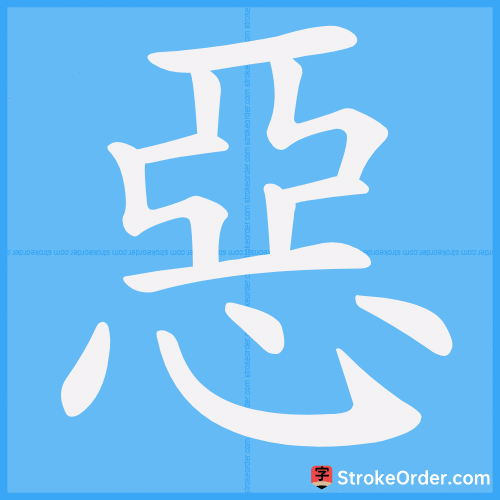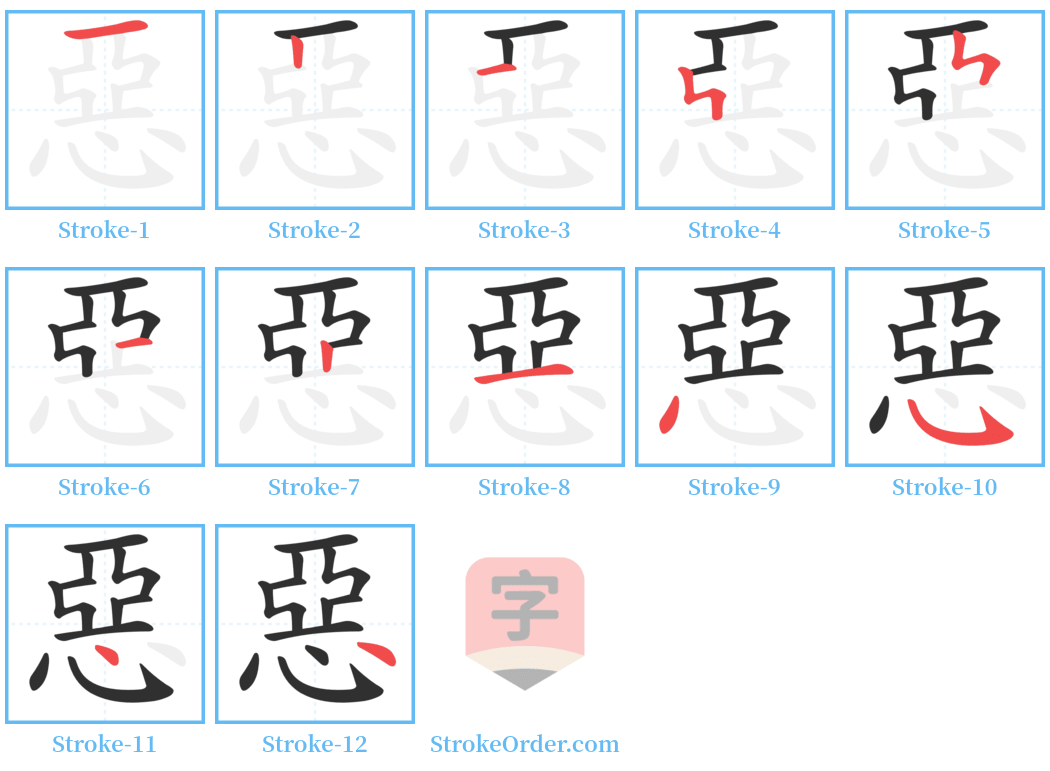惡 Stroke Order
Animated Stroke Order of 惡

Stroke Order Diagrams for 惡

Step-by-Step Handwriting Guide for 惡

Learn to Write Chinese Characters with Video Tutorials
Watch the video of writing the Chinese character "惡", learn the correct stroke order (笔顺) of the character "惡", and master the standard way of writing the character "惡".
Free Printable Handwriting Practice with Stroke Order: 惡
Printable Writing Practice Worksheet of "惡" in Portrait Orientation (Tian Zi Ge)

Printable Writing Practice Worksheet of "惡" in Landscape Orientation (Tian Zi Ge)

Information of 惡
Pinyin
è、 wù、 wū、 ě
Radical
心
Strokes
12 strokes
Usage
★★★
Definition
nauseated, evil, to hate / to loathe
惡
1. Sin, bad behavior.
2. Disease.
3. Dirt, filth.
4. Excrement.
5. Evil, bad.
6. Poor quality.
7. Ugly.
8. Discomfort, unhappiness.
9. Extreme, very.
10. Harm.
惡
1. Sin, bad behavior. “The gentleman restrains evil and promotes good, following the mandate of heaven.” 《I Ching》; “No evil goes unpunished, and no good goes unnoticed.” 《Records of the Three Kingdoms》.
2. Disease. “The soil is thin and water shallow, it is easy to encounter this illness.” 《Zuo Zhuan》; “Xie Jin practiced the Dao diligently, but often suffered from internal ailments that no doctor could cure.” 《Shishuo Xinyu》.
3. Dirt, filth. “Thick soil and deep water lead to no illness.” 《Zuo Zhuan》; “For treating animal sores, wash and cut to release the filth, then feed and nurture.” 《Rites of Zhou》.
4. Excrement. “Your left side is filled with slanderers, like noisy flies.” 《Book of Han》; “Mother suffered from severe dysentery, but misunderstood it as poisoning, and hence tasted the excrement.” 《Book of Sui》.
5. Evil, bad. “Even if one's appearance is good, if one's intentions are evil, it does harm.” 《Xunzi》.
6. Poor quality. “A scholar with aspirations for the Dao, who is ashamed of poor clothes and lowly food, is not worth discussing.” 《Analects》; “Even if a minister is thrifty and diligent, a country can still perish if he does not understand these matters.” 《Han Feizi》.
7. Ugly. “(Dan Tai Mie Ming) has a very ugly appearance and wanted to serve Confucius, but Confucius deemed him not worth it.” 《Records of the Grand Historian》; “In good times it is not a worry, ugly appearances do not complete the evil.” 《Selections of Refined Literature》.
8. Discomfort, unhappiness. “Since middle age, I've suffered from grief and joy, whenever parting from friends, I feel this discomfort for several days.” 《Book of Jin》; “My body has felt little discomfort, but noble gentlemen are near; you may visit and ask.” 《Shishuo Xinyu》.
9. Extreme, very. “The person has a large face and a short jaw, beauty and ugliness are extreme.” 《Huainanzi》; “Petite beauty is despised for being too thin.” Song Dynasty poet Xin Qiji.
10. Harm. “If you force yourself to eat when sick, drink too hot or too cold, or misuse treatment, it will only cause harm.” 《Huainanzi》.
惡
1. Hate, dislike.
2. Offend, anger.
3. Fear, dread.
4. Slander, malign.
5. Shame.
惡
1. Hate, dislike. “Only the benevolent can love others and hate others.” 《Analects》; “Worldly emotions decline, everything follows like a flickering candle.” Du Fu’s poem.
2. Offend, anger. “I bore a grudge against the high official Cao, leading to a case against me.” 《Water Margin》; “Since I had no other place to stay, I did not dare to offend.” 《Jing Shi Tong Yan》.
3. Fear, dread. “A person can live without clothing or food and not feel hunger or cold, but if they are afraid of death, there’s no harm.” 《Han Feizi》.
4. Slander, malign. “Two people are jealous of each other, and thus evil befalls.” 《Book of Han》.
5. Shame. “To have no feeling of shame or evil, is not human.” 《Mencius》; “This is the resentment of a hundred generations, and what Zhao should be ashamed of, but the king knows no evil.” 《Records of the Grand Historian》.
惡
1. Hate, dislike.
2. Offend, anger.
惡
1. See “惡心” (nausea).
參見「惡心」條。
如何、怎么。
表示惊讶的语气。
如何、怎么。 “Forsaking the father's command, how can I use a son!” 《Zuo Zhuan》; “With my ignorance, how can you avoid this title?” 柳宗元.
表示惊讶的语气。“What! What is this saying?” 《Mencius》.
如何、怎么。
表示惊讶的语气。